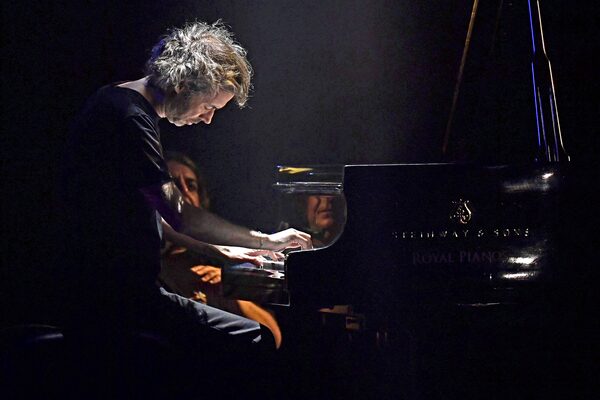
James Rhodes, seen here on Feb. 2, 2019, strode on stage in black jeans, a black t-shirt and white trainers and played three Beethoven sonatas from memory back to back.JAVIER SORIANO/AFP/Getty Images
There was some indignant huffing from the man seated next to me when James Rhodes dropped the first F-bomb in his opening patter at Koerner Hall last night, but by the time the next one came, my seatmate laughed too, as charmed as the rest of us.
Rhodes would no doubt be pleased with this development: He has been vocal about his mission to free classical music from its stifling, stuffy reputation, on-stage and off. “Classical music needs an enema—not awards,” he wrote in the Guardian culture blog after the 2013 Gramophone Awards. In the same piece, he lauded classical music for its “unceasing, infallible and soul-shattering ability to take us all on a journey of self-discovery and improvement.”
He would know. Classical music – specifically Gould’s Bach/Marcello Adagio to Concerto No. 3 – literally saved his life, smuggled into the psych ward on an iPod inside a shampoo bottle after a suicide attempt. Those lines are also a good way to characterize the intimate show he played last night: a perfect blend of the sacred and the profane. I hesitate to refer to it as a recital, because the witty banter between sonatas would be more at home at a rock concert. He wants his audience awake and alive throughout the performance, and he wants us to partake in music’s redemptive power.
Rhodes strode on stage in black jeans, a black t-shirt and white trainers and played three Beethoven sonatas from memory back to back, Nos. 15 in D Major, 27 in E Minor and 21 in C Major. “Beethoven wrote 32 sonatas in his life,” he told us, to introduce the first, and with a flourish of cheerful profanity asked the audience what they had accomplished today.
He described Sonata 15 as Beethoven on a pastoral walk through a forest, seeking peace. “But he’s Beethoven, so he’s going to kick a rabbit once in a while,” Rhodes said. Jokes aside, Rhodes’s devotion to the music was evident in every note. He coloured that journey with dynamic modulations, finding the rabbit with dramatic attacks but always returning to the central story with quiet, meditative moments. He’s been there, and it showed.
Sonata 27’s second movement became a dialogue between lovers that needed no words, with moments of tenderness and forceful recriminations in his voicings. This was a passionate and visceral argument at the keys.
Rhodes opened and closed the show with a return to Bach, an homage to Gould and the namesake foundation that brought him to Toronto. Since he recorded it in 2015 on Inside Tracks: The Mix Tapes, he’s found a new way in to the Bach/Siloti Prelude in B Minor that opened the show, giving it a voicing that’s slower and more contemplative.
The applause was sincere and went on long enough to earn three encores, the Schumann/Liszt Spring Night, then a moving performance of Gluck’s Orfeo ed Euridice from someone who’s been to hell and back. The final encore was a throwback to Rhodes’s first visit to Toronto in 2017, when he came to record a BBC radio documentary about Gould. He played the Bach/Marcello Adagio on Glenn Gould’s piano in the CBC’s Q studio then, excited as a kid at Christmas, and he played it again for us last night. It evoked Gould’s “state of wonder” for the pianist and for the audience, as it should have.
Find out what’s new on Canadian stages from Globe theatre critic J. Kelly Nestruck in the weekly Nestruck on Theatre newsletter. Sign up today.